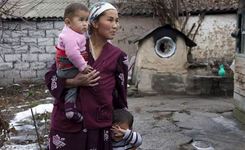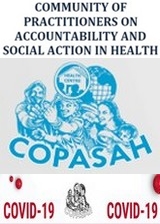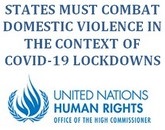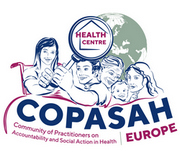
© UNHCR/A.Zhorobaev
http://www.unhcr.org/en-us/statelessness-around-the-world.html
The exact number of stateless people is not known, but UNHCR estimates that there are at least 10 million people globally – of which approximately one third are children.
Statelessness may occur for a variety of reasons, including discrimination against particular ethnic or religious groups or on the basis of gender; the emergence of new States and transfers between existing States; and conflict of nationality laws.
Statelessness is often the product of policies that aim to exclude people deemed to be outsiders, notwithstanding their deep ties to a particular country. For example, more than one million people in Myanmar’s Rakhine state are stateless on the basis of the current citizenship law, which provides that only members of certain ethnic groups are eligible for citizenship.
In addition, because some 27 States around the world do not allow women to transfer nationality to their children, statelessness can occur where fathers are unknown, missing or deceased.
Areas that have experienced large-scale displacement have also been significantly affected by statelessness. In West Africa, the estimated stateless population in Côte d’Ivoire is 700,000, many of whom were migrants of Burkinabé descent who were not eligible for Ivorian nationality after the country’s independence from France in 1960.
Statelessness due to the dissolution of former states also continues to affect many people, including some 600,000 people in Europe alone.
There have been notable examples where, through political will, it has been possible to resolve large protracted situations of statelessness. For example, the case of some 300,000 Urdu-speakers (sometimes referred to as Biharis) was resolved in Bangladesh in 2008. Similarly, the situation of the Brasileirinhos Apatridás, stateless children born to Brazilian parents abroad who were unable to acquire Brazilian nationality unless they went back to live in Brazil, was resolved in 2007. Estonia and Latvia have also both recently taken steps to further facilitate the acquisition of citizenship by those born in Estonia and Latvia to non-citizen parents, which will help ensure that these situations are resolved over time.
http://equalnationalityrights.org/
The Global Campaign for Equal Nationality Rights - Women
The Problem
Nationality laws in 27 countries worldwide prevent mothers from passing their nationality to their children on an equal basis with fathers. Over 60 countries deny female citizens equal rights with male citizens in their ability to acquire, change and retain their nationality, and to confer nationality to non-national spouses.
This discrimination results in significant human rights violations and suffering for individuals and families, contributing to myriad of problems. These laws are also in contradiction to international law, including state commitments to a number of international conventions.
Gender-Discriminatory Nationality Laws +
Women's Rights Violations:
Denying women and men equal nationality rights is a clear form of discrimination based on sex. The vast majority of nationality laws that maintain gender-based discrimination, discriminate against women by denying women equal rights to acquire, change, retain and confer nationality to children or spouses. These laws are often the legacy of laws implemented under colonial rule and are rooted in systems that held women to be unequal to men. Nationality laws that discriminate on the basis of gender are in contradiction to the Convention on the Elimination of All Forms of Discrimination against Women (CEDAW), which explicitly obliges States to guarantee equal nationality rights to women (Article 9). When a State denies equal nationality rights to women and men, it creates a category of second class citizens. Gender equality cannot be realized in a country that maintains gender-discriminatory nationality laws.
Statelessness:
Gender discrimination in nationality laws is one of the primary causes of statelessness, a status whereby an individual is not recognized as a citizen by any country. Statelessness can occur when children are unable to acquire their parents’ nationality, or when a woman loses her nationality due to her gender and marital status, in addition to other causes. Statelessness results in wide-ranging and significant human rights violations and hardships that can impact individuals and their families for generations. In addition to other human rights violations, stateless individuals are denied participation in political processes, including the right to vote and run for public office. There are an estimated 12 million stateless individuals worldwide. Ending gender discrimination in nationality laws is critical to eradicating statelessness and is listed as Action #3 in the United Nations High Commissioner for Refugees’ Global Action Plan to End Statelessness by 2024. Action #3 also calls for stakeholders to work with the Global Campaign for Equal Nationality Rights to realize this goal.
Obstacles to Children’s Education:
Gender discrimination in nationality laws impedes a child’s access to education in a number of countries. Stateless children and those living in their mother’s country without that country’s citizenship are often prevented from attending public school until all children with citizenship are registered and are often forced to pay higher school fees. Many, because of their nationality status, have no access to state-sponsored education. This situation continues through secondary and tertiary education, severely limiting children’s access to education and, later, job opportunities. This is in contradiction to State obligations to the Convention on the Rights of the Child (CRC), in addition to other human rights conventions.
Lack of Healthcare & Social Services:
When individuals lack citizenship due to sex-discriminatory nationality laws, they are also frequently denied access to social services including national healthcare. The higher costs of private healthcare can increase the occurrence of untreated diseases and inhibit preventative healthcare interventions. Affected individuals may also be denied driver’s licenses, bank accounts and access to social welfare programs. The marginalization and hardships faced by these individuals can also lead to social alienation and psychological distress.
Discriminatory Nationality Laws & Gender-based Violence:
Gender discrimination in nationality laws can contribute to gender-based violence. Women who have lost their nationality through marriage or whose children do not have access to their mother’s nationality may be less likely to leave an abusive marriage. Additionally, there is a higher risk of human trafficking among statelessness women and girls. Gender discrimination in nationality laws can also contribute to child and forced marriages. Girls who are without nationality in their home country may be forced into early marriage in hopes of obtaining greater security and access to the benefits of citizenship. Women who become pregnant as a result of rape have an increased risk of having stateless children when a State’s nationality is based on paternity.
Threatened Family Unity:
Countries that deny women equal rights to confer nationality to foreign spouses threaten family unity, including the child’s right to know and be cared for by his or her parents. For example, when foreign men are denied access to their spouses’ nationality, they may be forced to live away from their children due to challenges in acquiring residency permits and obstacles to employment. Couples have even reported not starting a family because of the hardships their children would face due to the mother's inability to confer nationality to her children.
Lack of Economic Opportunities & Poverty:
When women are unable to confer nationality on their spouses, their husbands may be denied work permits and must often pay expensive residency permits. Women whose children and husbands are denied her nationality may be forced to provide for the entire family, even when children reach adulthood. Children’s lack of educational opportunities due to discriminatory nationality laws can lead to a life of economic hardship and barriers to formal employment. Children denied citizenship through their mother are often prevented to acquiring their inheritance, including the family home. Denied social services only exacerbate these families’ vulnerability.
Violations of International Law:
Gender discrimination in Nationality Laws contradicts a number of international conventions and agreements, including the Universal Declaration of Human Rights; the Convention on the Elimination of All Forms of Discrimination Against Women (CEDAW); the Convention on the Rights of the Child (CRC), the Convention on Statelessness, the International Covenant on Economic, Social and Cultural Rights (ICESCR), and the International Covenant on Civil and Political Rights (ICCPR). CEDAW explicitly obliges States to guarantee equal nationality rights to women in the ability to acquire, change and retain their nationality, including the right to confer nationality on spouses (Article 9[1]), and to guarantee women equal rights to confer nationality to their children (Article 9[2]). Sex-discriminatory nationality laws impede children’s access to nationality and family unity, healthcare, and education, in violation of the CRC (Articles 7, 24 and 28 respectively).
National Resiliency & Development:
Discriminatory nationality laws deprive a country of the contributions of a segment of their populations, resulting in a lower GDP. Gender discrimination in nationality laws can also contribute to health threats to society due to untreated diseases. Equal nationality laws support greater national stability, economic development, good health and prosperity by allowing more people to contribute to their country’s economy and development. Eliminating discriminatory nationality laws also promotes a more engaged citizenry.
Source: WUNRN – 18.12.2017






























